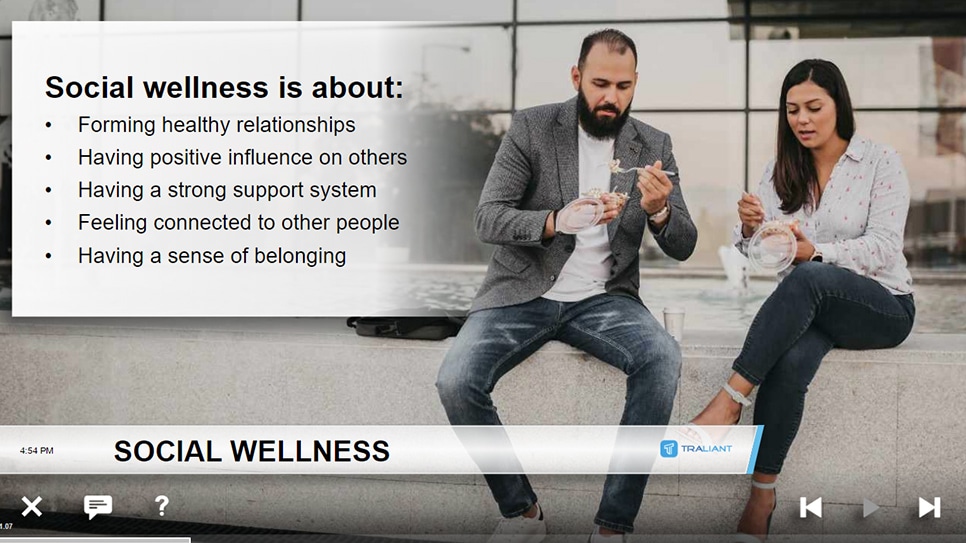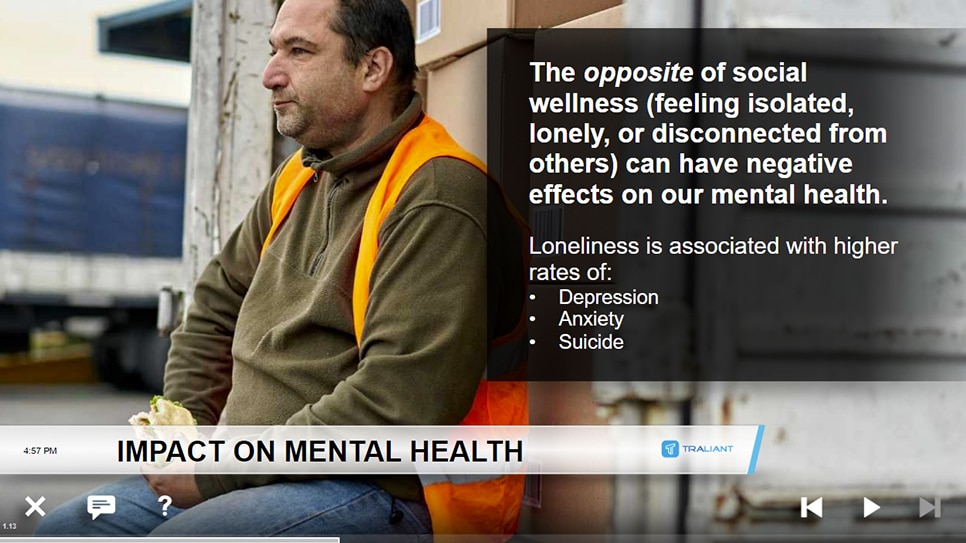
Employee Social Wellness Online Training Course
Promoting social wellness increases a sense of belonging in the workplace and helps employees be more resilient and productive
Course description
Social Wellness is a 10-minute course that introduces employees to the social dimension of wellness, providing ideas and practical ways to build healthy and supportive relationships. Viewer emails, tweets and interactive exercises address common questions and encourage learners to reflect upon their own social wellness.
ONLINE TRAINING
Social Wellness

Social Wellness covers these topics and more:
- What is social wellness
- Benefits of social wellness
- Impact on mental and physical health and society
- Social wellness in action
- Tips to improve social wellness
KEY FEATURES
Why you'll love our training
It’s time to embrace a new era of online training with a valued partner who will ensure seamless implementation, along with a learning experience your employees will truly enjoy.
Course administration
Traliant makes it simple to roll out training to your workplace and provide technical support directly to your employees at no additional cost.
Course customizations
Tailor courses to include your logo, relevant policies, workplace images, and more. Traliant can even customize the course with scenarios that take place in your own workplace environment.
Translations
Training is available in English, Spanish and is supported in over 100 languages.
What to consider when choosing the most effective Social Wellness training

- Promote employee well-being: Strong social connections can have a positive impact on an individual's mental and physical health. Training can help employees to develop stronger relationships, which can reduce stress and improve overall well-being.
- Increase employee engagement: Employees who feel connected to their colleagues are more likely to be engaged in their work.
- Improve team performance: Strong team dynamics and positive relationships among colleagues can lead to greater collaboration and better results.
- Empower employees: Training provides employees with the knowledge and tools they need to build and maintain healthy relationships and to develop strong social connections.
- Strengthen your organization's commitment to employee well-being: Training demonstrates the company's commitment to creating a workplace where everyone feels supported and valued.
- Reduce the risk of isolation and burnout: Employees who have strong social connections are less likely to feel isolated or burned out.
- Building and maintaining strong relationships: Cultivating and nurturing healthy relationships with family, friends, colleagues, and community members.
- Developing a strong support network: Having a group of people that you can rely on for support during challenging times.
- Contributing to your community: Giving back to your community through volunteering or other activities.
- Having a sense of belonging: Feeling like you are part of something bigger than yourself.
- Improved mental health: Strong social connections can reduce stress, anxiety, and depression.
- Enhanced physical health: Social connections can have a positive impact on physical health, including reducing the risk of chronic diseases.
- Increased resilience: Strong social connections can help people cope with challenging situations.
- Greater happiness: People who have strong social connections tend to be happier and more satisfied with their lives.
- Reduce the risk of depression and anxiety: Strong social connections can buffer against mental health challenges.
- Lower the risk of chronic diseases: Social connections can improve physical health and reduce the risk of heart disease, stroke, and other chronic conditions.
- Promote healthy behaviors: People who are socially connected are more likely to engage in healthy behaviors, such as exercising and eating well.
- Create stronger communities: Strong social connections build strong communities, where people feel supported and connected to one another.
- Creating opportunities for employees to connect: Organize team-building activities, social events, or volunteer opportunities.
- Promoting a culture of respect and inclusion: Ensure that everyone feels valued and respected, regardless of their background.
- Encouraging employees to build relationships: Encourage employees to connect with their colleagues outside of work.
- Providing resources for social support: Offer resources for mental health support and employee assistance programs (EAPs).







